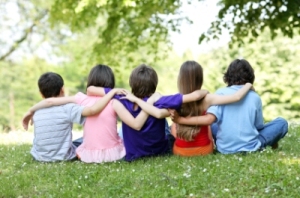 Early friendships are a trademark of childhood. While they can bring great joy, they can also bring challenge and even great sorrow. In childhood we learn to negotiate this process. The article “Helping Elementary Schoolers Deal With Social Conflict,” from the PBS Parents website, offers some great tips for children and parents alike.
Early friendships are a trademark of childhood. While they can bring great joy, they can also bring challenge and even great sorrow. In childhood we learn to negotiate this process. The article “Helping Elementary Schoolers Deal With Social Conflict,” from the PBS Parents website, offers some great tips for children and parents alike.
The experts from this article say that parents should teach their children how to handle social conflicts, rather than solving their problems for them. Here is a brief recap
- Expect your child to respect everyone and treat them with non-hurtful behavior, but respect their right to not necessarily like everyone or want to be their best friend. Respectful behavior means treated classmates civilly. If a classmate, rather than a friend, comes to your child’s lunch table and says hello or asks a question, civil means your child is expected to say hello back and answer their question. Civil means no meanness.
- Role model the behavior you want to see in your child. If you want your child to be inclusive, you need to exemplify that by who you talk to at their school or in your life. If you do not want them to gossip, refrain from this yourself.
- Don’t get over invested in their social life or as the article puts it, “dig for pain,” if something bad happens to them socially. Parents often experience two simultaneous things when their child is hurting or in trouble. It can be very painful to see your child experience pain like this for the first time or to see them inflict pain like this for the first time. It may also bring up their own pain or bad memories of school. Additionally, it may put a parent into Mama and Papa Bear form. This article encourages parents to focus on teaching their children how to handle the issue in a proactive way, to not over analyze it, and not become overly involved.
- What can you do then? You can teach them to learn to speak directly. “Emma, you hurt my feelings when you would not let me sit with you.” “ Hunter, I am sorry I hurt your feelings when I did not pick you for the game.” Even at this early stage in the game, you can begin to realize their goals are not necessarily your goals, when it comes to friendships and so many things. Accepting this is important and helping them capitalize on making and reaching good goals on the social front and other fronts -so important. Yet with this, it is important to be open about what you see in friendship dynamics (and your rights as a parent). You can congratulate a behavior in them or a friend or criticize a behavior in them or a friend, without criticizing a friend or them. For example, it is okay to express disappointment that Suzie did not give out invitations to everyone for her party, but only a select few. This will help them begin to analyze dicey and good friendship dynamics, by seeing you model this for them. This is different than saying Suzie was so selfish and inconsiderate to not give everyone at school an invitation for her party.
- Teaching them to solve problems independently is the ultimate emphasis, and something that can be considered separately. If your child comes home upset from school or a play date, you can ask them what happened and the following questions: “What did you try?”; “How did it work?”; and “What else could you try?” Give them time to respond to help the answer come from them. When you do this, it helps parents get out of the routine of always telling their children what to do.
Let’s face it. We are not always around to tell our children what to do. We need to equip them with the skills to make good decisions on every front. When they are equipped, a new behavior takes a hold, along with a sense of confidence and pride.

